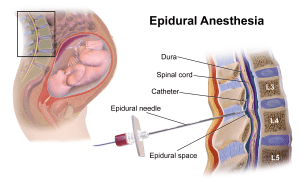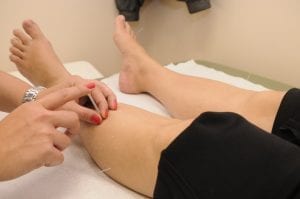Choices For Childbirth
Giving birth can and should be a beautiful experience, but the prospect of delivery may provide some women with anxiety because of the thought of up-coming pain and discomfort.

While many women choose to have epidurals to have comfortable labor, more opt for natural births; There is a growing fear about the side effects of medicated births and epidurals.
If you are unsure whether you should go for a natural birth or epidural, it’s better to discuss options with your doctor or midwife to determine what method is the best for you. Here are some important points to consider.
When Is An Epidural Used?
It’s a known fact that giving birth is extremely painful. Not only that, but the labor and contractions that come with it also add to the pain. Because of this, some mothers opt for an epidural to decrease it. Besides having a less painful delivery, hospitals will use epidurals on you if necessary—for example, cesarean delivery or c-section. Due to the surgery that will take place, women have to make an epidural (targeting the lower part of the body), which usually sets in about 10 to 15 minutes and works in another 10-15 minutes.

Benefits
When people say epidural, the first thing that usually comes to mind is a painless delivery. But instead of painless, because mothers still feel contractions, you can have a relatively less painful delivery compared to vaginal birth.
If a woman also undergoes a cesarean delivery or c-section, she must also undergo an epidural. As mentioned above, you might need epidurals because of the surgery that will take place to remove the baby from the womb.
Studies show that cesarean deliveries have increased by a massive 72% from 1997 to 2008; It’s no wonder that the number of women getting a c-section and its popularity has grown.
However, getting an epidural also has its risks. The following are some of the side-effects that come with epidurals:
- Back pain
- Soreness
- Headaches
- Continuous bleeding that won’t stop
- Fever
- Difficulty in breathing
- Decreased blood pressure, which can affect the baby’s heart rate by slowing it down.
While these risks exist, the chances of struggling with these side-effects are also rare. But other factors may lead to complications due to the length of recovery needed. Aside from that, cesarean deliveries have also been said to have a connection with having a higher risk of suffering from childhood chronic diseases like type 1 diabetes and asthma.
What Constitutes A ‘Natural Birth’?
Natural birth is when the mother does a vaginal birth or delivery without any medication. Usually, your doctor will skip an epidural; This is what people sometimes use to differentiate vaginal delivery and cesarean delivery.

Benefits
Because of the fear that using medication like epidurals will disrupt the natural response of the body to labor and birth, the statistics of having natural births significantly increased. More and more women are pushing to have natural birth instead of opting for epidurals.
Ashley Shea, the founder of Organic Birth, mentioned how women want to move around instead of staying still after giving birth. The thing is, if you are to get an epidural, you’re required to go to the hospital very early, therefore having to leave your home as soon as you can. Not only that, but the doctor and nurses will have to monitor you constantly closely and do cervical checks, making it a tad too invasive and disturbing. Once the baby has been born, you won’t be able to have immediate skin-to-skin contact with your baby, and chances are you’ll be interrupted when having that.
If you were given a chance to give birth in a warm, deep pool, surrounded by your husband and family, and then to give birth on your back with everyone around you telling you to push, would you still go for an epidural?

Because of the multitude of choices, mothers have the right to choose the type of delivery they want, including a natural birth.
Risks
Having a natural birth isn’t life-threatening at all. Nevertheless, like any other case, there are a few risks that are connected or associated with this. However, the risk isn’t due to the process of natural birthing itself but rather due to birth complications like your baby not being about to naturally move through the birth canal.
The concerns that surround vaginal birth are:
- Perineum tearing
- Increased pain
- Hemorrhoids
- Bowel movement issues
- Urinary incontinence
- Psychological trauma
Preparation
It’s one thing to know the risks, and it’s another to prepare for them. For you to decrease the possibilities of birth complications from happening, it would be good to be aware of the risks that might occur during natural birth.
If you’re unaware of what to do, you can sign up for childbirth classes, which will help you and keep you informed on the dos and don’ts.
Here are some methods used to help ease labor without the use of medication:

- Massages
- Acupressure
- Having a warm water bath
- Hot pack
- Breathing techniques
- Changing your position to relieve the pain in the pelvis caused by bodily changes
Natural Birth Or Epidural: The Bottom Line
Labor is an experience that differs from mother to mother. One method wouldn’t suit all mothers. But when recommending ways of birth, here are some factors that doctors and midwives take into consideration:
- The general physical and emotional health of the mother
- The pelvis size
- Tolerance of the mother to pain
- The intensity of the contractions
- Size or position of the baby

All mothers want a safe and peaceful birth. However, to do that, you have to be keen and careful, which means you have to take the necessary precautions to prevent birth risks from happening as much as possible. To do that, you have to weigh all of your choices and choose carefully. Never forget to talk to your doctor when making important decisions related to your pregnancy, especially when it comes to natural birth or epidural use. Only by this, you can safely bring your child into this world with little to no complications.
FAQs On Natural Birth Or Epidural
Does natural birth mean no epidural?
Yes, natural birth traditionally means delivering a baby without an epidural. Still, some experts are pushing for the destruction of the idea that moms who ask for epidural are not as good as the ones who don’t.
Is natural birth with epidural pain?
No, natural birth with an epidural is not painful. You may only feel pain post-childbirth.
Is a natural birth really painful?
The levels of pain that a mother experiences during natural birth differ from one person to another. Some experience excruciating pain; that’s why they are in labor for hours. Others’ cervix opens so quickly that they only need to push once or twice.
Can an epidural paralyze you?
Technically, the drug used during epidural cannot paralyze you. What may cause paralysis is the doctor’s malpractice.
Can you give birth naturally with an epidural?
Yes, you can give birth naturally with an epidural. It mostly works to numb the pain, but a lot of mothers on epidural can even walk around and do vaginal birth.
Can you push with an epidural?
Yes, most moms can push with an epidural in their system. Its primary side effect is that you may need to push longer than necessary.
Why should you not get an epidural?
When deciding between a natural birth or epidural, know that moms don’t opt for the latter because of the side effects they hear about it. Still, you should not get an epidural if you have other medical conditions that may be affected or aggravated by it.
Can you die from the pain of giving birth?
No, you cannot die from the pain of giving birth. Death usually takes place if the pregnancy comes with health complications, such as high blood pressure, severe blood loss, and internal bleeding.
What is painless delivery?
Painless delivery takes place when you agree to get an epidural injection between the spine. It numbs you from the legs down, so you may not feel it as your baby comes out of your vagina.
How long after epidural does the baby come?
The baby may come after two to four hours of having an epidural in your body. Studies found that the drug prolongs labor.
Last Updated on January 11, 2023 by Rejie Salazar
DISCLAIMER (IMPORTANT): This information (including all text, images, audio, or other formats on FamilyHype.com) is not intended to be a substitute for informed professional advice, diagnosis, endorsement or treatment. You should not take any action or avoid taking action without consulting a qualified professional. Always seek the advice of your physician or other qualified health provider with any questions about medical conditions. Do not disregard professional medical advice or delay seeking advice or treatment because of something you have read here a FamilyHype.com.